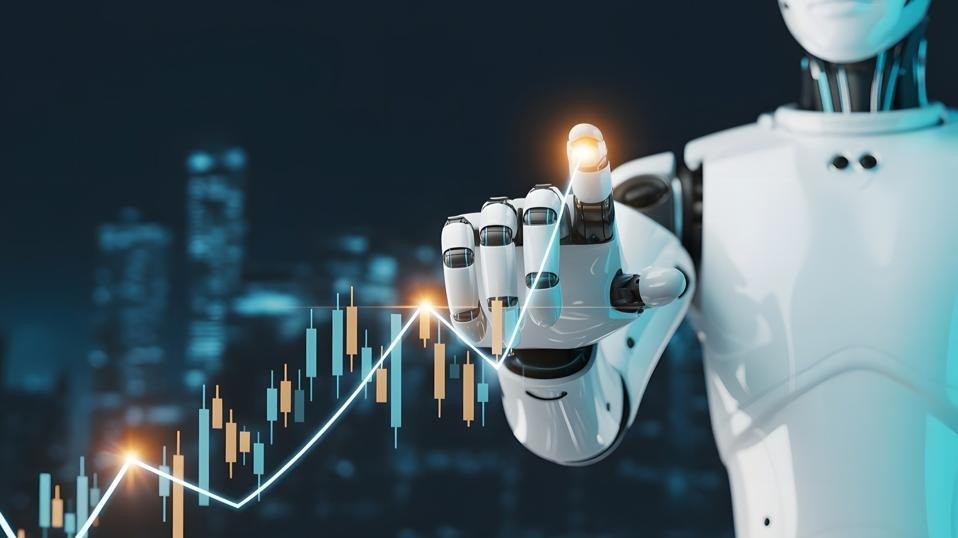Space, AI, And The Future Of Human Potential
30 September 2025
The first time you experience weightlessness in space, Tom Marshburn told me, all the noise and pressure of launch suddenly disappear. One moment, the roar of engines shakes every bone in your body; the next, you are floating in perfect silence. “All the noise, all the sound, all the hyper G just suddenly goes away, and suddenly you are weightless, and that is a wonderful moment,” he recalled.
That sense of transition captures more than the astronaut experience; it reflects a wider shift underway in the space economy. Marshburn, who has spent 337 days in orbit, now helps lead Sierra Space, a company building spacecraft, habitats, and technology that could reshape industries here on Earth. Our conversation revealed how commercial space, AI, and medicine are converging in ways that will open entirely new opportunities for businesses and societies.

The Rise Of A Commercial Space Economy
Marshburn has flown on the Shuttle, the Russian Soyuz, and SpaceX’s Crew Dragon. Today, his focus is on Sierra Space’s Dream Chaser spaceplane and expandable habitats. The Dream Chaser is designed to deliver cargo and eventually people to orbit, landing as gently as a commercial airliner. “Wherever you can land a 737, you can land the Dream Chaser,” he explained. This creates the potential for payload delivery and even medical evacuation from orbit to any major metropolitan area.
Equally striking are Sierra’s inflatable habitats, which can expand up to five times their original launch size. For astronauts, this means more space to live, work, and reconfigure. For businesses, it means laboratories, entertainment venues, or even manufacturing sites in orbit. Marshburn believes such technology will help build the foundation of a true space economy, where pharmaceuticals, semiconductors, and advanced materials can be produced in ways impossible on Earth.
He pointed out that zero gravity allows scientists to grow nearly perfect crystals, something sedimentation prevents on the ground. That breakthrough could transform computing and communications.
Medicine And Healthcare Lessons From Orbit
Perhaps most surprising is how lessons from space can directly reshape healthcare on Earth. Marshburn described how he was trained for only one hour to perform ultrasound scans before a mission. Guided in real-time by experts on the ground, he and his colleagues produced diagnostic images as accurate as those taken by trained technicians.
The implications are enormous. “That kind of is the idea behind being able to provide medical care to a small remote team, which obviously translates to not only people that live in rural areas or countries that do not have adequate healthcare, it also applies in the U.S. and the inner city,” he said. Simple, portable devices that can be operated with minimal training could revolutionize how medical care is delivered in underserved communities, dramatically cutting costs and response times.
The efficiency and immediacy of space medicine may well influence healthcare innovation far beyond orbit, inspiring systems that are faster, cheaper, and more accessible.
AI As The Next Crew Member
Every major leap forward in space now relies on AI. Marshburn described how thousands of miniature organ samples could be tested in orbit to evaluate new drugs. Managing and interpreting the flood of data would be impossible without machine intelligence. “AI is gonna be essential with all the inputs that are needed to make sure they understand their environment, the output, and that we get from that,” he told me.
AI will also be indispensable on long missions where communication delays make real-time support from Earth impossible. A crew on Mars, for example, would face a 45-minute delay in signals back and forth. In such cases, an AI assistant will be vital for decision-making, monitoring health, and guiding experiments.
Yet Marshburn is clear about the balance of roles. Robots and AI can handle repetitive tasks and sift vast datasets, but humans bring the curiosity, adaptability, and judgment needed for breakthroughs. “If you put the geologist on the surface, only the geologist, as far as I know, can say, Oh, what is this over here? ' This is interesting, let me go look at that too,” he said. The future is about human and AI collaboration, not substitution.
Leadership Lessons From Space
Perhaps the most unexpected insights from our conversation were about leadership. Marshburn commanded the International Space Station on Expedition 67, working with a small team in extreme conditions for months at a time. Success, he explained, requires humility, trust, and emotional intelligence.
“Every individual is good at something, but no individual is good at everything. So it requires an injection of a certain amount of humility in the team that you are working with,” he reflected. He also stressed curiosity and tenacity as defining traits for the next generation of astronauts and leaders.
His advice applies well beyond spaceflight. Recognizing the value of diverse skills, creating mutual trust, and deliberately building team cohesion are lessons every executive can apply on Earth.
An Inclusive Future In Space
One of the most forward-looking points Marshburn made was about accessibility. Sierra Space is exploring how to design spacecraft for people who would never have been selected as astronauts in the past, including those with chronic illnesses or sensory impairments.
Of course, this vision also pushes technology to adapt in ways that could benefit life on Earth. Systems designed to support a blind astronaut navigating through sound cues, for instance, might later improve safety in hospitals, aircraft, or smart buildings.
Looking Down On Earth From Orbit
After nearly a year in orbit, Marshburn has gained a perspective few of us can imagine. He spoke of Earth as resilient, yet the conditions that sustain human life appear delicate when viewed from space. "The Earth seems like it could just shrug us off in a second, and space and the Earth would not notice. I find that means that human beings are incredibly precious," he said.
That perspective fuels his hope and his urgency. He believes humanity must care for each other, safeguard our planet, and continue to reach outward. And then the push into space is just a step towards securing a future for generations to come.
Why It Matters For Business Leaders Today
What struck me most in speaking with Tom Marshburn is how interconnected the space economy is with the challenges and opportunities facing every business today. AI is transforming how we interpret data, healthcare lessons from orbit are reshaping medicine, and leadership insights from a space station apply to boardrooms on Earth.
As companies look to the next decade, the message is clear. Space is not a distant frontier. It is a laboratory, a business hub, and a classroom for the future of humanity. Leaders who pay attention to these lessons now will be best prepared to thrive in a world where the boundaries between Earth and orbit are becoming ever thinner.
Related Articles
Why The AI Supercycle Will Fail Without Advanced Networks
By now, “smart” versions exist of just about every home appliance, gadget and gizmos we can think of. However, manufacturers continue[...]
The Two-Tier AI Economy: Why Half Of Companies Are Being Left Behind And How To Close The Gap
By now, “smart” versions exist of just about every home appliance, gadget and gizmos we can think of. However, manufacturers continue[...]
5 AI-Era Skills Mistakes That Will Cost Your Business Millions In 2026
By now, “smart” versions exist of just about every home appliance, gadget and gizmos we can think of. However, manufacturers continue[...]
5 ESG Trends That Will Shape Business in 2026
By now, “smart” versions exist of just about every home appliance, gadget and gizmos we can think of. However, manufacturers continue[...]
The 5 Robotics Trends In 2026 You Must Get Ready For Now
By now, “smart” versions exist of just about every home appliance, gadget and gizmos we can think of. However, manufacturers continue[...]
10 Generative AI Trends In 2026 That Will Transform Work And Life
By now, “smart” versions exist of just about every home appliance, gadget and gizmos we can think of. However, manufacturers continue[...]
Sign up to Stay in Touch!
Bernard Marr is a world-renowned futurist, influencer and thought leader in the fields of business and technology, with a passion for using technology for the good of humanity.
He is a best-selling author of over 20 books, writes a regular column for Forbes and advises and coaches many of the world’s best-known organisations.
He has a combined following of 4 million people across his social media channels and newsletters and was ranked by LinkedIn as one of the top 5 business influencers in the world.
Bernard’s latest book is ‘Generative AI in Practice’.










Social Media